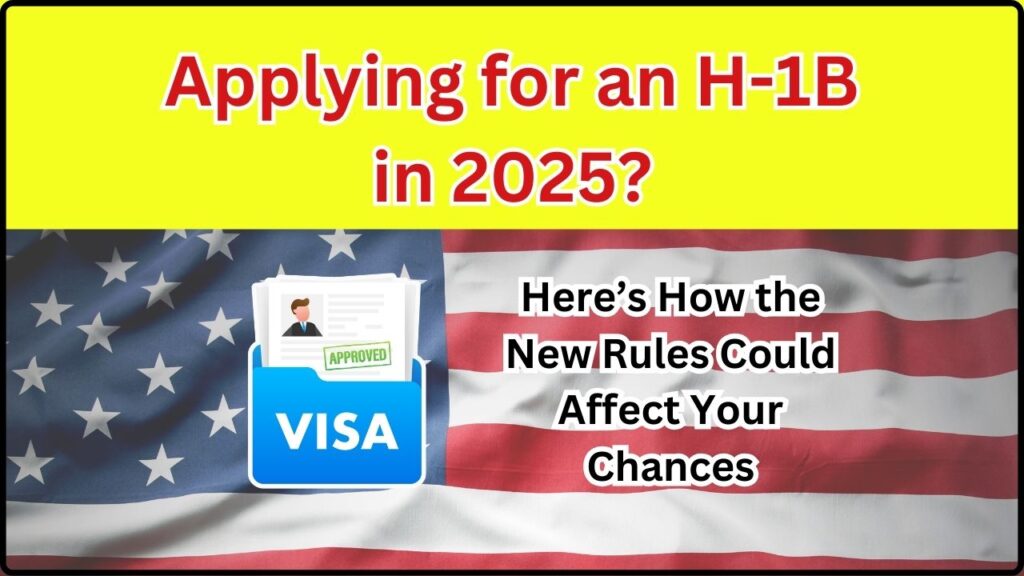
Applying for an H-1B in 2025? If you’re planning to apply for an H-1B visa in 2025, understanding the latest changes is crucial for improving your odds and avoiding costly mistakes. The U.S. Citizenship and Immigration Services (USCIS) has rolled out major updates to the H-1B program that affect how applications are submitted, selected, and processed.
These changes aim to create a fairer, more transparent system while cracking down on fraud and exploitation. Whether you’re an employer looking to hire global talent or a skilled worker hoping to live and work in the U.S., this comprehensive guide will explain everything you need to know about the new H-1B visa rules in 2025.
Applying for an H-1B in 2025?
Applying for an H-1B visa in 2025 involves more than just paperwork — it requires strategy, precision, and awareness of the latest rules. From a new lottery structure to increased fees and fraud controls, the USCIS is working to modernize the system and eliminate loopholes. Whether you’re a skilled professional seeking opportunity or an employer hoping to bring in top talent, staying informed is your best tool for success.
| Aspect | Details |
|---|---|
| Lottery System | Beneficiary-centric model: each person gets one entry, regardless of how many companies apply on their behalf |
| Registration Fee | Increased from $10 to $215 per registration |
| Registration Dates | March 7 to March 24, 2025 (for FY 2026) |
| Updated Form | Form I-129 (new version mandatory from Jan 17, 2025) |
| Cap-Gap for F-1 Students | Extended until April 1 of the following year |
| Anti-Fraud Measures | Passport verification, worksite scrutiny, multiple submission prevention |
| Job Eligibility Criteria | Refined definitions for “specialty occupations” |
| Employer Accounts | New USCIS organizational accounts for efficient registration |
| Official Resource | USCIS H-1B Cap Season |
What’s New in the H-1B Lottery for 2025?
The biggest shift in 2025 is the move to a beneficiary-centric lottery. This means if five different employers register the same individual, that individual still only gets one entry in the lottery.
Why is this important? In previous years, some applicants had significantly better odds because they were submitted by multiple companies. That created a loophole — and concerns about fairness and fraud. The new rule levels the playing field by ensuring everyone has an equal chance, regardless of how many companies sponsor them.
Only if that person is selected will USCIS notify all employers who submitted a registration, and any of those employers can proceed to file the full H-1B petition.
Higher Registration Fees: What You Need to Know
Starting in April 2024, the H-1B electronic registration fee increased from $10 to $215 per person. This dramatic fee hike reflects USCIS’s attempt to recover administrative costs and improve service delivery.
Advice for Employers:
- Budget accordingly, especially if you’re submitting multiple registrations.
- Make sure each registration is legitimate and that you’re truly interested in employing the candidate if selected.
Revised Form I-129
All petitions filed on or after January 17, 2025, must use the updated version of Form I-129. This form is required to request H-1B status for foreign workers.
Using an outdated form will result in immediate rejection, so double-check the version before submission.
Cap-Gap Extension for F-1 Students
In a win for international students, the cap-gap extension for F-1 visa holders now continues through April 1 of the following year (previously September 30). This gives students more time to bridge the gap between OPT (Optional Practical Training) expiration and the start of their H-1B status.
Stronger Fraud Prevention and Compliance Measures
The updated H-1B rules bring in strict fraud detection protocols, including:
- Mandatory passport or travel document verification at the time of registration.
- Cross-checking for duplicate submissions from multiple employers.
- More scrutiny of third-party worksites (e.g., if you’ll be working for a client company instead of the sponsor).
What This Means for You: Make sure every detail is accurate and that the sponsoring company is genuine and compliant with U.S. labor laws.
Clearer Definition of Specialty Occupations
To qualify for an H-1B visa, the job must require a specific bachelor’s degree or higher in a specialty field, and the applicant must hold that exact degree.
Examples of Acceptable Matches:
- A job in software engineering requires a degree in computer science or software engineering.
- A job in data science might accept a degree in statistics or data analytics.
Not Acceptable: A general business degree for a computer programming job.
This clarification ensures that only highly specialized roles are eligible and that applicants are truly qualified for the position.
New USCIS Organizational Accounts for Employers
Employers can now use Organizational Accounts on the USCIS platform to collaborate across departments, legal teams, and HR. These accounts simplify the registration and petition submission process.
Benefits Include:
- Shared access among internal stakeholders
- Easier tracking of multiple applications
- Better coordination with attorneys
Demand Still Far Exceeds Supply
The demand for H-1B visas remains extremely high. For FY 2025, USCIS received over 470,000 registrations, even though the annual cap remains:
- 65,000 for regular H-1Bs
- 20,000 for U.S. advanced degree holders
If your registration isn’t selected, you won’t be able to apply for a cap-subject H-1B visa that fiscal year — although cap-exempt options may still be available (e.g., jobs at universities or nonprofit research institutions).
Practical Timeline for Applying for an H-1B FY 2026 (2025 Application Year)
- Early February 2025: Create USCIS account
- March 7–24, 2025: Electronic registration period
- Late March 2025: Lottery results released
- April 1–June 30, 2025: Filing period for selected petitions
- October 1, 2025: Approved candidates can begin working
H-1B Visa 2025: New Regulations Revealed; Could They Impact Your Application?
What is H-1B Visa? Check Eligibility and Application Process!
H-1B Visa Debate: India Responds, Collaborates with IT Companies for Solutions
Frequently Asked Questions (FAQs)
Q1: Can I increase my chances by getting multiple companies to register me?
No. Under the new system, each beneficiary gets only one lottery entry, no matter how many employers submit registrations.
Q2: Can I work during the gap between OPT ending and H-1B starting?
Yes, if you qualify for the cap-gap extension, which now runs through April 1 of the following year.
Q3: What happens if my H-1B isn’t selected?
If not selected in the lottery, your employer cannot file a petition. You may explore cap-exempt employers, consider enrolling in further education, or look at other visa categories like O-1 or L-1.
Q4: Is the new Form I-129 mandatory?
Yes, starting January 17, 2025, the new form is required. Submissions using old forms will be rejected.
Q5: How can I ensure my job qualifies as a specialty occupation?
Your job must require a specific bachelor’s degree (or higher) directly related to the duties. General or unrelated degrees will likely be disqualified.








